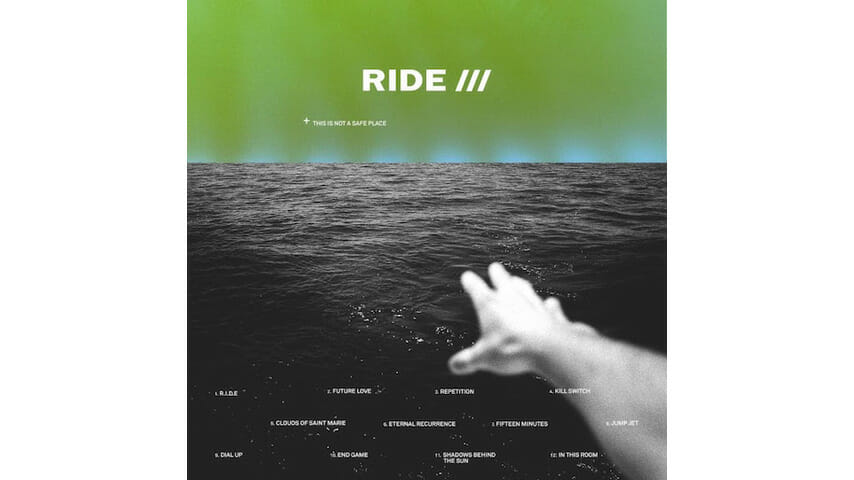
Shoegaze had one hell of a run in 1991. My Bloody Valentine dropped their dissonant masterpiece Loveless and four other legendary bands—Slowdive, Swervedriver, Chapterhouse and Ride—all released their debut albums. Ride’s first LP and melancholy sonic mountain, Nowhere, remains one of the genre’s all-time greatest records, as does their chunkier, supercharged 1992 follow-up, Going Blank Again. 1994’s Carnival of Light saw the Oxford quartet dive into Teenage Fanclub-like jangle and psych pop to mixed reception and 1996’s Tarantula was a self-described disaster, leading to their breakup that year. By the time the band was on the ropes, Britpop became the British indie’s scene’s newest crush, essentially bookending the brief reign of English shoegaze.
When My Bloody Valentine returned with 2013’s m b v, one that actually lived up to the wildest hopes and dreams of their fans, perhaps other shoegaze bands saw an opportunity to try and rival their own respective classic works. In 2015, Swervedriver released their first new music since the ‘90s, with Slowdive doing the same two years later. Ride also joined in on the rekindled shoegaze love fest, reforming to play Coachella and a few other festivals in 2015, following it up with a new album, Weather Diaries, in 2017—their first in over two decades.
Weather Diaries was a clear departure from the vigorous dream pop that defined their early days. They wrote about political crises, integrated more electronic elements and relied on guitars more for their chiming shimmer than their potential for cacophony. An EP titled Tomorrow’s Shore followed in 2018, which fused hypnotizing synth work with their celebrated pop harmonies.
Apart from the occasional flash (the outro to “Pulsar,” the guitars on “Lannoy Point,” the driving bass and floaty quality of “Home is a Feeling”) Ride have largely avoided attempts to reconjure their classic sound. Their new album, This Is Not A Safe Place, doesn’t change course in that regard either. Ride’s post-reunion material is bolstered by modern recording technology not available to them at their peak, so their urge to explore new sounds is understandable. While This Is Not A Safe Place is lofty in its lyrical and sonic ambitions, Ride don’t always stick the landing.
Featuring co-lead vocalists Mark Gardener and Andy Bell’s satisfying vocal harmonies, lead single “Future Love” is largely catchy and a capsule of the euphoria before a relationship sparks, but it has too many clunky melodic ideas squished into one. It feels like they’re grasping for straws, seeing what sticks and leaving in the parts that don’t—particularly parts that make you forget why you fell in love with the band in the first place.
Another single, “Repetition,” showcases psych pop vocals harkening back to Carnival of Light, but paired with pulsing synths and a payoff that never quite arrives, it never penetrates deeper than surface level, despite its interesting lyrical nod to neo-expressionist artist Jean-Michel Basquiat (“They want you just to repeat and stay the same / Even though repetition is a form of change”). “Kill Switch,” one of their most glaring departures, builds an atmospheric post-punk tension, but it’s strange hearing an uncharacteristically tender and comforting band lurk in an animalistic manner.
Ride connects most when their song structures feel organic and don’t require dissection to find your entry point. “Clouds of Saint Marie” flows with natural, heartwarming energy, and Gardener’s soft voice never awkwardly stretches to fit the mold of unconventional melodies. “Jump Jet” also has an easily accessible groove as the band takes you through the discombobulating, dehumanizing effects of constant touring. It arrives far too late, but final track, “In This Room,” is one of the album’s most exultant moments with Gardener’s sympathetic vocals shielding against life’s demons and their all-knowing guitars twisting, warbling and frolicking in improvisational fashion.
Even though their pursuit is in the noble spirit of experimentation, it takes too long to decode the melodic arc of several songs, making them easy to forget. While “Eternal Recurrence” has an intoxicating guitar sprawl and affecting lyrics inspired by the Bataclan shooting, Gardener’s vocal melodies fizzle out. Similarly, the spoken-word vocals on “15 Minutes” don’t capture the song’s emotional lyrical intensity, mulling over life-changing mistakes. There are too many dangling melodic dead ends to effectively accentuate their sporadic glimmers of instrumental intrigue. The slightly drone-y outro of “End Game” and the dark, Cure-like introspection of “Shadows Behind the Sun” are bright spots, but they aren’t enough to steer the ship.
This Is Not A Safe Place never quite finds its footing. The lyrics are a snapshot of the band’s current frame of mind—those recurring thoughts that fire when you turn in for the night. They’re deeply personal and never self-important, but also not particularly cohesive or thematic on the whole. Tracks range from unabashed love songs (“Future Love”) artistic manifestos (“Repetition”), wispy, fond memories (“Clouds of Saint Marie”), ruminations on grief (“Eternal Recurrence,” “Shadows Behind the Sun”) and deconstructions of betrayal (“End Game”). Weather Diaries wasn’t without its missteps, but it had more immediate, uninhibited melodies and a lyrical robustness. This Is Not A Safe Place proves Ride aren’t artistically stagnating, but the melodic pop infrastructures of several songs feel like an afterthought when it used to be the crux of their appeal.